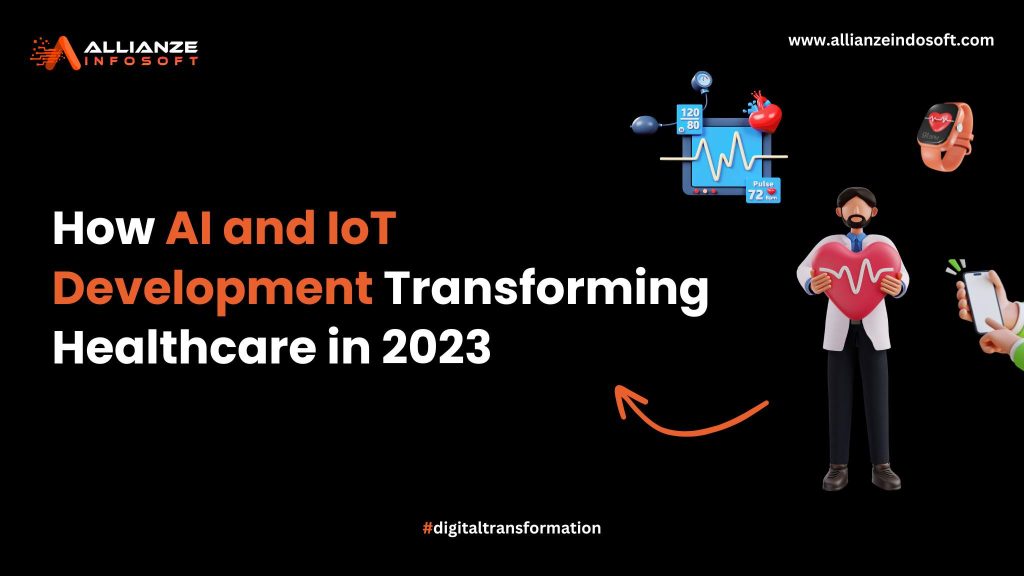
Good health is a cornerstone of human happiness, and a strong health industry plays a vital role in fostering healthy communities and contributing to a country’s growth. The healthcare industry is undergoing a digital transformation. In this pursuit, the integration of Artificial Intelligence (AI) and Internet of Things (IoT) technologies is reshaping the landscape of healthcare, promising more efficient patient monitoring, effective treatments, and streamlined processes. Let’s delve into the transformative potential of the development of AI and IoT solutions in healthcare and explore how they are changing the face of the industry in 2023 and beyond.
The Burden of Inefficiency
Healthcare professionals face increasing demands on their time. Doctors, nurses, and administrative staff must grapple with a slew of manual, repetitive tasks:
- Patient intake and discharges
- Appointment scheduling
- Billing and claims processing
- Medical inventory management
- Staff coordination and scheduling
This administrative burden contributes to clinician burnout and takes away from critical face time with patients. It also leads to preventable medical errors that cost lives and billions in expenses.
AI & IoT: Automating Healthcare Tasks
AI and IoT offer a solution through intelligent automation of routine healthcare workflows. Chatbots armed with natural language processing handle patient queries and appointment bookings. Predictive analytics algorithms optimize medical staff schedules. Inventory sensors and trackers automate supply chain management.
By deploying AI and IoT to shoulder administrative tasks, healthcare providers free up staff to focus on delivering quality patient care. This enhances job satisfaction and reduces costly employee turnover. For instance, when Emory Healthcare automated bed assignments using an AI system, it increased its bed utilization rate by 30%.
Remote Patient Monitoring with IoT Medical Devices
IoT connected devices are making healthcare more accessible and convenient outside hospital and clinic settings.
These devices enable remote patient monitoring, reducing the need for in-person visits:
- Smart inhalers with built-in sensors can track usage and provide real-time guidance to help asthma patients improve inhaler techniques from home.
- Smart glucose monitors allow diabetics to check blood sugar levels in real-time, rather than relying on periodic in-clinic HbA1c tests. The data is automatically logged and shared with providers.
- Wearable ECG monitors like the Apple Watch can detect abnormal heart rhythms and alert both patients and doctors.
- Pill bottles with built-in tracking can monitor whether patients are adhering to medication regimens.
These and countless other IoT devices are transforming healthcare from reactive to proactive by catching issues early before they require hospitalization.
AI-Driven Healthcare Insights
With machine learning and deep learning, AI systems can process massive datasets far faster than humans can. Healthcare organizations can tap into the power of their data to derive game-changing insights using AI.
Some examples include:
- Detecting cancer and other diseases earlier through AI analysis of medical images and records.
- Predicting individuals’ future health risks using algorithms that identify correlations in populations.
- Optimizing treatment plans and drug dosages based on Digital Twins simulations.
- Matching patient records to clinical trial criteria to enable recruitment.
- Developing customized care plans and recommendations tailored to each patient’s unique health data.
These insights enable more personalized, effective, and proactive care – key pillars of the healthcare industry’s shift toward precision medicine.
The Future with AI & IoT
The healthcare IoT market is projected to grow at a CAGR of 25.2% to reach $534.3 billion by 2025. The transformative power of AI and IoT will lead to healthcare that is predictive, preventative, and precise.
Here are some exciting possibilities:
- AI chatbots and virtual assistants that offer 24/7 access to healthcare advice and triage, reducing the strain on primary care.
- Computer vision algorithms can detect early signs of disease from small changes imperceptible to the human eye.
- Blockchain-secured health data exchange platforms that enable easy, secure data sharing across providers.
- Edge computing with rapid analytics is performed directly on medical devices rather than the cloud.
- 5G networks that support real-time analytics of streaming data from wearables and remote patients.
- AI and robotics augment – rather than replace – doctors and nurses, enhancing their capabilities.
While there are valid concerns around privacy, bias, and misuse of these technologies, responsible implementation can lead to enormous benefits for both patients and healthcare workers.
Conclusion
From automated workflows to data insights and at-home care, AI and IoT are driving a revolution in healthcare delivery. These technologies will continue disrupting and elevating the industry for the betterment of populations worldwide.
If your business seeks to harness the power of AI and IoT in healthcare, Allianze Infosoft offers leading AI and IoT solutions for businesses of all sizes. Learn more about how our healthcare AI and IoT development services can elevate your healthcare practices by reaching out to us at support@allianzeinfosft.com
